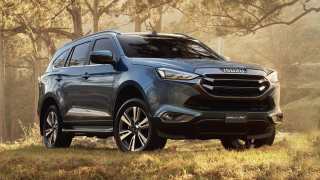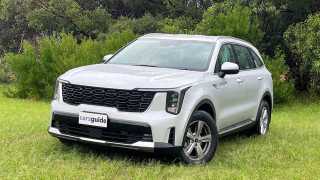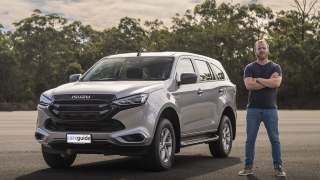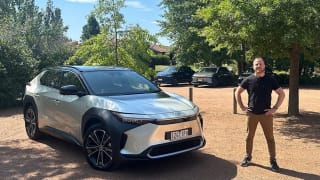
Porsche electric cars and hybrids in Australia: Everything you need to know
- Porsche Cayenne
- Porsche Macan
- Porsche Panamera
- Porsche Boxster
- Porsche Taycan
- Porsche Taycan 2022
- Porsche Sedan Range
- Porsche SUV Range
- Porsche Wagon Range
- Sedan
- Sport
- SUV
- Wagon
- Electric Cars
- Hybrid Cars
- Porsche Cayenne Reviews
- Porsche Macan Reviews
- Porsche Panamera Reviews
- Porsche Boxster Reviews
- Porsche Taycan Reviews
- Porsche
- EV Advice
- Porsche Advice
- EV
- Prestige & Luxury Cars
- Green Cars
- Hybrid cars
- Hybrid
- Plug-in hybrid
- Electric Cars
- Electric
- EVs
- Sports cars

When German car manufacturer Porsche - a brand famous for its world-class, high-performance, fuel-guzzling sports cars - announced it would begin making Porsche electric car and Porsche hybrid models, it sent a clear signal that Electric Vehicle technology was undoubtedly set to be the way of the future for all car brands - even the sexy ones.
While we’re sure Porsche is pleased with the reduction in carbon-dioxide emissions that such a future entails - who doesn’t want to save the planet and be an environmental do-gooder - it’s reasonable to assume that the famous sports-car brand is probably more enamoured with the fact that its very fast performance cars now have the potential to go even faster thanks to its clever efforts to harness EV tech for feel-good reasons as well as environmental good.
Read more about Porsche Panamera
- 2021 Porsche Cayenne Turbo GT price and features: New super SUV to take on BMW X5 M, Audi RSQ8 and Tesla Model X
- 2022 Porsche Taycan price and features: Tesla Model S rival and Audi e-tron GT twin goes rear-wheel drive in line-up expansion
- 2022 Porsche Macan price and features: Increased performance for BMW X3, Audi Q5, Volvo XC60, Lexus NX and Mercedes-Benz GLC rival's second facelift
The history of the Porsche EV
Porsche’s first foray into electrified vehicles started a little over a decade ago with the unveiling of two hybrid vehicles in 2010 and 2011 (only a couple of years after Tesla came out with its very first EV, the Roadster).
Those models were the Cayenne S Hybrid mid-size SUV and the Panamera S Hybrid, each sharing the same drivetrain and packing a supercharged 3.0-litre V6 internal-combustion engine, a 35kW electric motor and an eight-speed Tiptronic transmission.
Both cars featured self-charging batteries that stored electricity produced through regenerative breaking - the process of taking kinetic energy produced when the car slows down and transferring it to the battery.
By 2014, Porsche had released its first Plug-in Hybrid Electric Vehicle (PHEV) - a hybrid that’s able to charge its battery by plugging in to an external power source - in the form of the Cayenne S E-Hybrid.


Download the EVGuide Report, 2022
Australia's one-stop snapshot of all things relating to electric cars.
The first Cayenne S E-Hybrid’s all-electric range was relatively tiny compared to today’s hybrids - between 18 and 36km - but it had the distinction of becoming the first plug-in hybrid in the premium SUV segment.
Then, in 2019, we saw the debut of Porsche’s first series production electric car, the Taycan (or “lively young horse”, which is the rough Turkish translation - anyone who’s driven one will tell you it’s definitely a thoroughbred), which arrived in several variants offering different performance levels (the high-performance models were given the designations “Turbo” and “Turbo S”, despite not actually having a turbocharger - confusingly reassuring).
Porsche electrified vehicles available in Australia
Taycan

Price: From $158,100 to $351,000, plus on-road costs
Porsche’s state-of-the-art EV comes in a variety of flavours, from a rear-wheel drive sedan base model that can go from zero to to 100km/h in 5.4 seconds and has a top speed of 230km/h, all the way through to the range-topping Turbo S, which is quite possibly the greatest EV performance car on the planet, boasting a top speed of 260km/h and acceleration of zero to 100km/h in 2.8 seconds. It is, believe us, a genuinely stomach-flipping thing to drive.
In between those you’ll find models with all manner of varying specs, including the 4 (signalling the car has all-wheel drive/), the 4S (“S” for “Sport”, aka higher performance and extra bells and whistles) and the Cross Turismo (the sporty wagon version of the Taycan).
Panamera E-Hybrid

Price: $252,700 to $433,500, plus on-road costs
Porsche hasn’t forgotten to put the “perform” in its performance hybrids, ensuring that each Panamera’s electric motor adds extra punch to the 2.9-litre twin-turbo V6 (it cuts down on fuel consumption, too, but it’s probably safe to say that Porsche was slightly more concerned with its customers’ need for speed).
Again, you’ll not be left wanting in terms of model variants: there’s the Executive for those that want a bit more flash and cabin space, the Turismo sports wagon variant and the top-of-the-range Turbo S E-Hybrid, boasting a top speed of 315km/h and zero to 100km/h in 3.2 seconds.
Cayenne E-Hybrid

Price: $150,900 to $311,100, plus on-road costs
The Cayenne SUV, once seen as sacrilege for a brand that prided itself on sexy sports cars, has now become one of Porsche’s most popular models - indeed, some would suggest that a shit to SUVs, which now make up 70 per cent of all Porsche sales, kept the brand alive.
The Cayenne PHEVs come in a couple of Coupé variants for those who like the sleek, sporty look of a sloped roof, even in their SUVs, and the base model features a 3.0-litre turbocharged V6 engine with a 100kW electric motor (the Cayenne Turbo S E-Hybrid comes packing a 4.0-litre twin-turbo V8, giving it considerably more grunt).
The future of Porsche EVs

Porsche has already announced an all-electric version of its Macan crossover set for release in 2023, which will feature a new EV platform called the Premium Platform Electric (PPE). An electric Porsche Boxster is also rumoured to be not far away.
Porsche has also turned its attention to battery cells for racing, announcing that it will start producing high-performance battery cells that use new silicon anodein tech in a joint venture with battery firm Customcells.











Comments